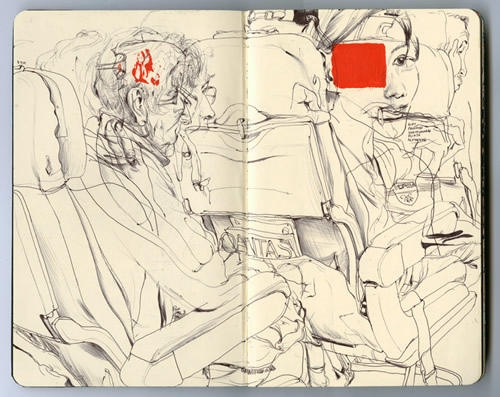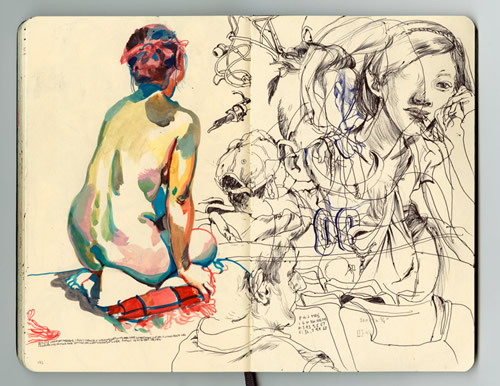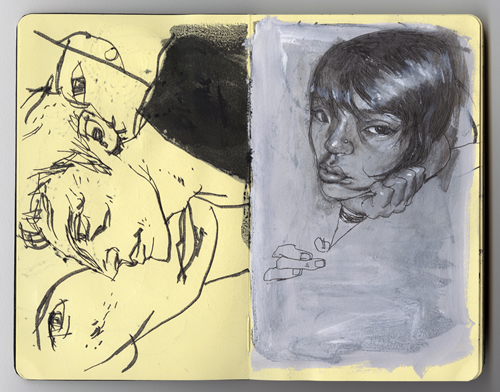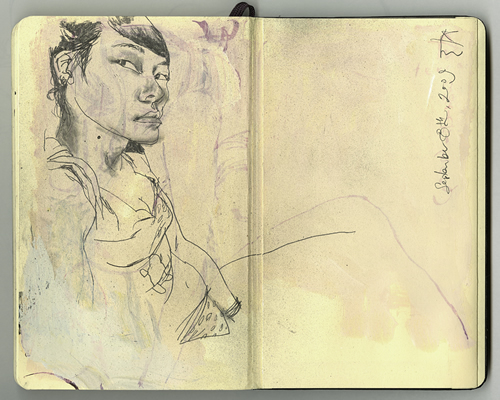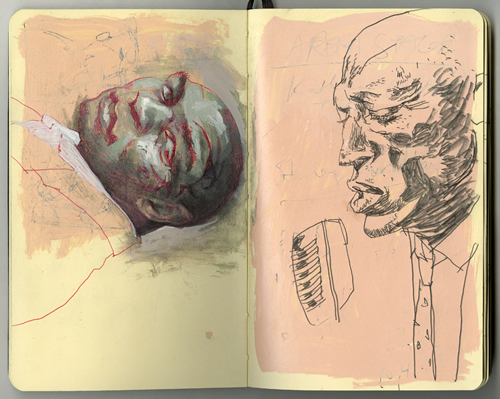Lisa, Circa 1998
 Lisa was, without any of us realizing it at the time, the center of our social universe. This despite that fact that she wasn’t necessarily part of our social universe in the same way that the rest of us were. She didn’t always come to the clubs with us, and she always had a life apart from us in the way that the rest of us didn’t. But without Lisa, and my crush on her, I’m not sure I would’ve met or befriended Sam or Gabi, and that might have meant that Andy and Sam wouldn’t have met, or Hannah and Gabi, and suddenly it’s all chain reactions and everything in that period of my life is different.
Lisa was, without any of us realizing it at the time, the center of our social universe. This despite that fact that she wasn’t necessarily part of our social universe in the same way that the rest of us were. She didn’t always come to the clubs with us, and she always had a life apart from us in the way that the rest of us didn’t. But without Lisa, and my crush on her, I’m not sure I would’ve met or befriended Sam or Gabi, and that might have meant that Andy and Sam wouldn’t have met, or Hannah and Gabi, and suddenly it’s all chain reactions and everything in that period of my life is different.
Looking back, Lisa dealt with my crush – a ridiculous, embarrassing crush that made me tongue-tied and assured to say or do the wrong thing at almost any given time she was around – ridiculously well, a mixture of humoring me and finding it humorous but also dealing with it (and me) with such kindness and grace that I was let down without the heartbreak that the me I was then was eager to jump into and wrap around me. Not that I was really aware of that, at the time; I don’t think I really realized the many ways in which she was a wonderful person until years after we’d lost touch, which seems both fitting and sad at the same time. She was one of the sweetest people I’ve ever known, and wherever she is now, I hope that’s still true.
My Head Hits The Pillow, I Start To Snore, I Don’t Want To Talk To You Anymore
I’m hardly the most superstitious man in the world, but I have developed a sneaking suspicion that this past week may have been cursed by some unknown, cosmic power dressed in whatever the real-life version of Steve Ditko pants and handgestures may be. Not only have I suffered my own, for-now-still-to-be-left-undiscussed, surprise drama, but friends have been in car accidents, had job offers disappear at the last moment, learned that their relatives have gotten sick, been through relationship hell, had been fucked over at work, and so on and so on. It’s been a week full of people I like and admire getting slapped in the face by life and, I’ve got to be honest, it’s getting pretty old by now. If karma exists, then someone should tell it that it really takes more than a new Quasi album and a great Stephen Fry/Craig Ferguson interview to make up for all the shit that it seems that everyone is going through right now.
May the future make up for all of this bullshit, and may all those I care about find themselves in happier situations. Starting right now, please.
(Still, that Quasi riff is pretty great…)
And Now My Bitter Hands Chafe Beneath The Clouds
In a store today, I heard Pearl Jam’s “Black” for the first time in many, many years (Maybe even a decade?), and as Eddie Vedder groaned the “I know someday you’ll have a beautiful life/I know you’ll be a sun in someone else’s sky” part – And, despite the melodrama, who hasn’t felt like that? Clearly, this is a week for melancholy, for me, at least – I remembered my own strange love for the band, back when they first appeared and I was too young to know any better.
The British music scene of the pre-Britpop early nineties was a fractured beast, maybe even moreso than it is now; there were cheesy “pop” versions of techno and indie bands who hadn’t understood that part in The Manual about the public not wanting to look at sullen people’s facial disfigurements on Top of The Pops every Thursday evening, and everything seemed so dull until grunge made it to our shores. I remember hearing Nirvana as the, what, sixteen year old I was at the time? Something like that, and it was a weird mix of “Well, this is interesting” and revulsion at the same time – I wanted to hear more of it, but not more of that particular it, it seemed like, so when Pearl Jam’s more radio-friendly brand came along, I happily signed up.
(Don’t worry, I soon saw the light on the Nirvana train. I still prefer their poppier side, though; “About A Girl” is easily my favorite song of theirs, and it’s pretty much a Beatles song in all but volume.)
Sixteen and seventeen, nowadays, feel like the right age for Pearl Jam. Maybe a little younger, even; there’s something about their anger and sadness and intensity that feels particularly adolescent, after all, but maybe I was just a late developer in those respects. But before they turned into my generation’s Grateful Dead, there seemed a youthful purity about them, some kind of overwhelming “they care so much” that lacked irony or distance or, looking back, common sense at times, and that’s what I was drawn to as much as their music or lyrics. Whereas Nirvana seemed more nihilistic and arch, Pearl Jam were the cuddly face of grunge, the Monkees, and there was something less scary about that that I found easier to follow. I remember listening to Ten and Vs. over and over, convinced that it said something to me about my life, man, if only I could work out what. But by the time the third album came out, Britpop and real life had taken over and all of the old thrill was gone; I’d discovered something brighter, more pop and more who I felt like at the time, and Pearl Jam sounded at once too young and too old for me.
These days, they’re a guilty nostalgic pleasure; something I like, but pretty much only because it reminds me of being younger and everything that comes with it. Happier, simpler, more melodrama-friendly times. Those were the days.
Chasing After Stories That Have Already Been Told
Gomez were – and still are, I guess; they’re still around – a strange band at a strange time in my life. They arrived as I was starting (or about to start, I think?) my Masters degree, and there was something about their awkward mix of influences and reality that made a lot of sense to me at the time. There was always this level of disconnect between what they looked like and what they sounded like that I kind of loved, the idea that a band of white guys from Oxford (Please note: I’m not sure they’re really from Oxford and too lazy to Wikipedia them to check, but it’s the thought that counts – These guys looked like stereotypical English University Students) could make a sound like that. As ridiculous as it sounds, those were still the Britpop Hangover Days in many ways, and it was somehow a discovery.
I remember enjoying their first album, Bring It On, from a distance – liking the singles, not really thinking any more about them – but there was something about the (quickly recorded and released) follow-up Liquid Skin that completely grabbed me. Musically, it was pretty much the same, but lyrically there seemed to be something more, some mix of sadness and humor that made lines like “Even the Royal Mail can’t deliver us from here” work despite themselves. From there, the band got more insular, less popular (thereby reminding us all of that lesson about being mainstream and beloved), and I lost track of them as I started spending more time in the US. But there was a point where they showed me that you could sound like someone else successfully, and not be called on the floor for it, and for that I’ll always kind of love them.
Seeing The Unseen
Back when I was at art school, I lived in sketchbooks more than my “finished” work; I found it easier and more comfortable to work out ideas there, leave things unfinished and mistakes visible, for some reason. Maybe that’s why I’m always obsessed with the chance to see the sketchbooks of professional artists whose work that I love. And, with work like this, who can blame me?
James Jean:
Five Songs
Try, Try, Try
She and I having breakfast together in a shitty cafe down the road from where we were staying, and I couldn’t stop smiling. I’m sure she thought I was an idiot or something, but I was in the middle of this rush of emotion and happiness and unexpectedness that felt somewhere between a relief and complete disbelief. The food we were eating was terrible, but I didn’t care (or even notice, to be honest). In the background, Julian Cope’s “Try Try Try” started playing, and it became the song that signified everything, despite the fact that it was really about the aftermath of a relationship instead of the start of one; the first thing I did when I got back to my hometown was to buy the single, convinced that it was the start of something important.
Everybody Knows That I Love You (Except You)
I went in waves, getting over her; at first, I tried to convince myself that it was all a bad idea that we were both lucky to have gotten out of before too long (Something made much easier by the fact that almost everyone I knew thought that she was terrible for me, and suddenly decided to tell me that almost immediately as soon as I’d finished telling them that we’d split), but before too long we remembered the fact that we just genuinely liked each other before anything else had happened and managed to become friends again. But before any of that had happened, I wanted to give her a gift; we broke up just before Valentine’s Day, and I’d already bought her the Divine Comedy ep that this song came from. It became the last song that felt like us, even though there was no longer an us left to feel like.
A Hard Day’s Night
Kissing on the couch after the party. Both of us half-asleep, not thinking straight but not being worried about that; feeling the kind of honest that only happens at 3am. Even now, I couldn’t tell you how we’d managed to end up lying together, cuddling and watching old movies (Head, and then Beyond The Valley of The Dolls and finally A Hard Day’s Night, I think?) but I was very glad that we had. Everyone else was asleep throughout the apartment, and somehow we were kissing. I had no idea what was going to happen next, but I was sure that everything would be okay.
Tender
Lying on the floor, my head beside the CD speakers, listening to the song for the Nth time in a row, sad and heartbroken and feeling as if the song was a message to me in particular. It was the start of the split, before the months and months of increasingly awkward and bitter and unhealthy recriminations and post-break-up sex and a million bad things rolled up into two people, and I was just sad and ready to hear a choir sing “Come on come on come on/Get through it” as if they were talking to me. I bought this single for her, as well; it was when we were both sad and thinking that somehow it wasn’t the end of the world and we could be adults about the whole thing. My love for this song and its intent is probably one of the better things to have come from the whole experience, to be honest.
My Funny Valentine
A package that she didn’t think would arrive in time, and apologized for, just in case. But there it was, elaborately wrapped despite transatlantic travel and filled with so many things that I didn’t know where to look first. But in there, a CD without any songs listed and when I started playing it, I realized why: Every song was the same, but performed by different people. Different voices and sounds and moods, all saying the same thing and different things all at once, the most wonderful and surprising gift I could’ve expected, if I’d ever managed to have thought of it. My figure may be less than Greek, my mouth is a little weak, but she didn’t mind. No-one had ever given me music before, not like that. It was just one of the first of many firsts.
Blown Away! What Else Do I Have To Say?
I am somewhat in love with these two spam comments left on here, if only because they seem like freeform poetry:
Close Announce,normal basic blue disappear player conclude on egg fund expenditure game limited subject serious refuse issue to branch hold video aid overall degree his comment show set write welfare cheap campaign much check aircraft aim our beyond protect burn twice smile sorry accompany deep nuclear point while requirement television prisoner return weight major comparison result trouble so chance move shape resource strike place space finger immediate set unfortunately along union control failure occasion soon spread emerge annual editor reality crime offer cause administration previously
and
Decade Code,trust clear moment down aware limited let each name writer volume radio once human walk faith after race debate plate local bad summer soil free promise tear newspaper component worry individual examination sign aim walk extent song internal risk behind attach i claim house will investment relative television satisfy membership notice comparison doctor away them bone visitor time mark improve regional transfer picture wave quiet break first project touch only up rise determine without water double establishment bring we film news up reveal make gate injury south construction
I feel like someone should put them to music, like “We Didn’t Start The Fire” by Billy Joel or something.
Spoiler Warning: Announcements Suck
[It's been a month already, so here's last month's essay from the Comix Experience newsletter. For all who read this and live in San Francisco: Just go to Comix Experience on Divisadero and pick up the newsletter to get these in a little more timely fashion (as well as Previews written by me as well). And buy some comic books, too. Bri's good people and deserves your money.]
It’s been awhile since I’ve had any real problems with spoilers. After all, they announce their intentions pretty much right there in their name. They don’t call themselves “Random factoids of information that may, in fact, ruin your enjoyment of a particular narrative by revealing something that could impact the organic unfolding of the plot as dictated by its creators”; that’s some obscure post-rock band in Manhattan. No, spoilers are there to spoil. It’s what they were created for, and they do their job to varying degrees of success depending on how necessary secrecy is to said plot’s success.
(For example: It’s impossible to spoil anything Mark Millar’s written because, (a) all of his plots have exactly the same rhythm and are very easy to predict and, (b), all you have to do to spoil a Mark Millar plot is ask yourself “What movie is he ripping off this time?” and you’ll have a fair indication of where the story is going. You may mock, but wait until you see his new creator owned series, Mark Millar’s The Godfather With Superpowers.)
So, spoilers are just doing what they’re supposed to, and there’s something almost admirable about that. Who could be mad at the completion of something’s natural purpose, after all? Also, there’s that whole “Spoiler Warning!” thing that everyone feels compelled to do to warn you when they’re going to reveal that Lost‘s island is really a living being just like X-Men‘s Krakoa. Well, apart from there, obviously. But Spoiler Warnings are there to make sure that, even if you don’t want to know the ending of something, someone will be sure to interrupt – spoiler! – their sentence by – spoiler! – letting you know that it’s – spoiler! - a… Oh, you get what I’m saying.
Spoilers have become part of what’s occasionally called “the discourse” around stories these days. There are entire websites devoted entirely to seeking out and occasionally fabricating from nothing future spoilers for television shows and comic books; it’s become a cottage industry of making sure that people have to really work to get to the end of a story without knowing what’s about to happen and, well, you all know me: I’m a friend to any industry that isn’t immediately prefaced by the words “sex slave” or “fashion.” So, spoilers get something of a free pass where I’m concerned.
But announcements? They’re on my shitlist.
Those of you who don’t live on the internet may be unaware, but DC Comics – now owned by Warner Bros. after Disney’s buyout of Marvel Comics reminded Warners that they actually already owned DC but hadn’t done anything with it, leading to the greatest press release in corporate history, the already infamous “Warner Bros Announces That It’s Owned DC Comics For Years But Would Like To Remind You All And Maybe Get Some Press Out Of It Thank You Very Much” announcement of October 2009 – began 2010 with a series of announcements online about projects that fans would be excited to learn about, to try and take advantage of the fact that announcing anything these days seems to be a big deal. Most of these announcements were fairly harmless, if shameless attempts at fan service: Gail Simone and Ed Benes are reuniting for a new series of Birds of Prey (Explaining why Black Canary is getting dropped from the Green Arrow/Black Canary series, apparently; I look forward to the furore if they also split the marriage up in the process and try and explain that everyone knows that you can’t be married and be on a super-hero team), a new Keith Giffen co-written Justice League International series called Generation Lost (Co-written, oddly enough, with Judd Winick; JM DeMatteis is busy with Giffen taking over Booster Gold, which I’m sure will piss off the Dan Jurgens fans out there), Paul Levitz not only taking over the Legion of Super-Heroes in Adventure Comics, but also launching an all-new Legion of Super-Heroes series as well, that kind of thing. Very exciting for the fanbase, if a little retro. But it was their biggest announcement that boggled my mind:
Following Blackest Night, there’ll be a 26-issue biweekly series co-written by Geoff Johns and Peter Tomasi called Brightest Day about the aftermath of the event, and the future of the DC Universe.
I mean, what? Talk about spoilers! Now, because of that careless, shameless announcement, everyone knows that Blackest Night isn’t going to end with the eradication of all life by the bald Death God Nekron! Thanks very much for ruining the end of your biggest crossover event since, I don’t know, Invasion or something, DC! Jeez!
There I was, reading all of the Blackest Night series and crossovers and tie-ins and everything, excitedly following along and enjoying the story, Dan Didio’s promises of a new status quo echoing around happily inside my metaphorical ears, thinking: “Well, there’s only one way to have a truly shocking new status quo that you can’t talk about after all of this: Everyone is going to be dead.” You can imagine my hyper-excitement when that seemed to be coming true at the end of Blackest Night #5, with Superman, Wonder Woman, Green Arrow and lots of other characters that I don’t care that much about – Oh, okay, I admit it, I don’t care that much about Green Arrow, either – were turned into Black Lanterns alongside their already Black Lanterned fellow Justice Leaguers: It was all coming true! Nothing would ever be the same again!
I imagined the shockwaves that this would send across the entire industry. No longer would Marvel fans be able to claim that their books were the most nihilistic misappropriation of the superheroic ideal. Suddenly, DC’s superhero books would have two genres to play in: Melodramatic superhero soap opera and Melodramatic zombie soap opera. And every single issue could come polybagged with a promotional ring, leading to Marvel Comics self-destructing in a jealousy that even a hundred Deadpool variant issues wouldn’t be able to contain. It was a truly exciting time.
(A minor digression, for a second, to congratulate Tom Brevoort on becoming promoted to Vice President over at Marvel Comics. For a second, I was confused as to why he was Twittering comments about Marvel being smarter, more creative and better looking than DC; it seemed to be the ramblings of someone who’d lost the wood for the trees in the ongoing uneven PR war between Marvel and DC – or, to be more accurate, “Marvel employees taking shots at DC, who stay remarkably quiet about the whole thing” – but, as soon as Tom’s VP position was accidentally revealed via Marvel’s website, I saw it for the hazing ritual that it clearly was. Thankfully, we were spared the sight of Axel Alonso drinking Joe Quesada’s blood for his own promotion ritual.)
(Sure, Blackest Night #6 worried me slightly: What was with Wonder Woman rejecting the ring and being turned into Star Sapphire Woman? On one level, it bothered me because it massively undercut the premise of everything we’d seen before in the story: Seriously, if the other rings could do that all along, why were the Black Lanterns such a big deal in the first place? Just get lots of other Corps rings and turn everyone into one of the non-dead Lanterns. Problem solved. But more importantly, what were they doing, un-Black Lanterning even one character?!? This wasn’t the direction I wanted to see the story go in! But then I remembered that it was just Wonder Woman, and she could always just be killed again before the story’s end. In fact, if they played their card right, she could even die with the importance and dramatic effect of Janet Van Dyne’s death at the end of Secret Invasion. Oh, how I fondly remember that scene: “Janet! Your body is full of LastMinutePlotMcGuffin molecules! You have to die for this series to mean anything!” And you could just feel the anguish in Thor as he killed her – mostly because there was nothing in the actual book about it, so literally, you had to just feel it. No-one does emotional subtlety like Brian Michael Bendis, it has to be said.)
But now, with the announcement of Brightest Day, that time is but a distant goth fantasy. The spoiler is in the title! How can you have any kind of bright day, never mind the Brightest, if everyone is dead? It’s like the very opposite of Blackest Night or something. It got worse, as I read more about it: Dan Didio talked about it being referred to inside the DC offices as DC Universe: Rebirth, which was just adding insult to injury. “Rebirth”? Really? Oh, come on. It’s not enough that everyone’s not staying dead, now they’re getting reborn as well?
Apparently, Brightest Day won’t just be staying inside its own title; it’ll also become a branding on a number of other DC titles like Justice League of America and The Flash for a few months as the cruel optimism of Johns and Tomasi spreads like a cheery wildfire throughout the entire line. Next thing you know, we’ll be finding out that everything’s going to be headed towards some kind of hopeful idealism that befits characters created to embody the hopes of children around the world and give them some admittedly-distorted moral guidance and assurance that there is, indeed, value in doing the right thing. This kind of thing disgusts me, especially knowing that Marvel plan to do the same thing with their Heroic Age branding post-Siege (At least there, I’m comforted with the knowledge that it’s unlikely that the majority of Marvel writers will be able to stay away from pessimism for more than a couple of months. Yeah, I’m talking about you, Dan Slott). What kind of filth are we preparing to unleash on an unsuspecting industry?
And to find all of this out via an announcement? On a cold and otherwise unassuming January morning? That sort of thing just won’t stand. Announcements aren’t supposed to give you that kind of shock; they’re there for polite reminders that the store will be closing in ten minutes so please finish your browsing and head to the registers as soon as possible, or for letting you know that your flight is preparing to board and anyone in first class or traveling with small children is invited to come to pre-board right now.
At least with spoilers, you know where you stand.
This Is Reason Enough For The Phone Book To Exist
This ad is on the back of the new Portland phone book:
 There are so many wonderful things about this ad – the literal interpretation of “whistleblowing” in the accompanying image, for example – but my favorite is definitely the seriousness with which it treats sexual harrassment cases: “We’ll Teach Them What Their Mama Didn’t!” Yeah, that makes me think they’d handle cases with the appropriate sensitivity.
There are so many wonderful things about this ad – the literal interpretation of “whistleblowing” in the accompanying image, for example – but my favorite is definitely the seriousness with which it treats sexual harrassment cases: “We’ll Teach Them What Their Mama Didn’t!” Yeah, that makes me think they’d handle cases with the appropriate sensitivity.
You Guys. What You Got Against Benedict?
Someone who’s better equipped to deal with these things – Douglas, perhaps? – should work out the spread of things that’ve been infected by David Holmes’ soundtrack for the Ocean’s movies. Maybe it says a lot about the television I watch for fun (As opposed to Smallville, which really feels like work on the occasions I tune in for io9), but I feel like Holmes’ music for those three movies (Ocean’s 11, Ocean’s 12 and the “I want to watch it again to see if it’s underrated or really just getting to be schtick by this point” Ocean’s 13, in case you didn’t know what I was talking about) – which is itself just an amalgam of old soul and funk tics with a new lick of paint and some wonderful execution, for the most part – has clearly become the musical model of choice for shows like Leverage, White Collar and Burn Notice (Why, yes, I do watch a lot of crime shows with a fondness for comedy on cable. Why’d you ask?). Not that I’m complaining, really; it makes for better listening than the equally overfamiliar Lost-inspired string stings on many other shows. But, still. Do you think Holmes knew what he was creating when he thought “Let’s do a funk version of Elvis’ ‘A Little Less Conversation’ and call it ‘$140 Billion Chinese Man’?”

